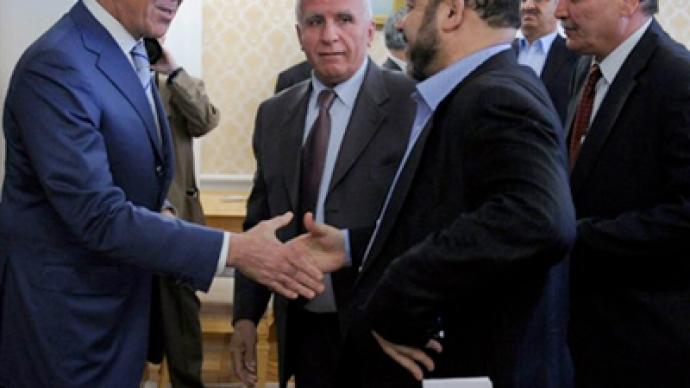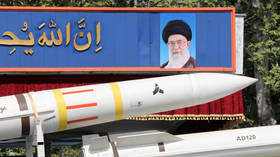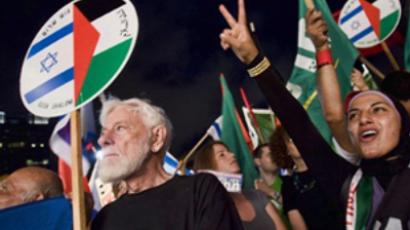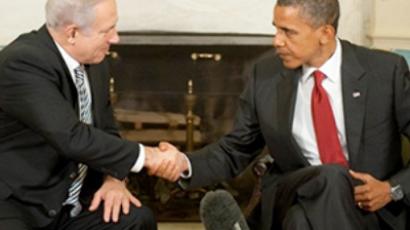Palestinians in Moscow drumming up support

As pressure mounts for a solution to the decades-long Middle East crisis, Russian Foreign Minister Sergei Lavrov on Monday had something of a historic meeting with Palestinian representatives of Fatah and Hamas factions in Moscow.
Moscow views the reconciliation between the various Palestinian political factions, signed into force in Cairo on May 4, as an important step toward the elusive peace that continues to escape the Middle East negotiators. There were 11 signatories to the accord, which included a long-awaited compromise between the West Bank's Fatah and Gaza Strip's Hamas movements.On April 27, Fatah and Hamas announced the two organizations had reached a "historic consensus" to unify the two parties into one government, with plans for general elections to be held in 2012.Israel, which considers Hamas a terrorist organization, has been watching the developing situation with keen interest.Meanwhile, Russia, a permanent member of the UN Quartet for Middle East Peace, has declared its interest in all of the Palestinian forces joining the election campaign in the Palestinian territories."As a permanent member of the UN Security Council and an active member of the Quartet, Russia is sincerely interested in all Palestinian forces’ participation in the election campaign, on the basis of the principles laid down in the Palestine Liberation Organization Charter and in the Arab Peace Initiative," Lavrov told representatives of Palestinian organizations.If all Palestinian forces join the election campaign, "this will allow the achievement of such results at the forthcoming elections that will be most adequate to the task of creating a Palestinian state living in peace and safety with all its neighbors," he said.During their Moscow visit, the representatives from Palestinian organizations agreed upon an important declaration that will further facilitate the process of implementing the Cairo agreements, Lavrov said.Meanwhile, Fatah representative Azzam al-Ahmad singled out the Russian Institute of Oriental Studies and the Russian Foreign Ministry, which invited the factions to Moscow, for playing an important role in the unification of the Palestinian political forces.The declaration agreed upon in Moscow augments the provisions of the Cairo agreements and underlines the need for defending this document on the international stage, he said.The Palestinian delegation in the Russian capital includes Fatah member Azzam al-Ahmed, Mussa Abu Marzuk of Hamas, and Maher al-Taher of the Popular Front for the Liberation of Palestine, according to diplomats close to the negotiations.Is a pre-1967 agreement possible?Russia, in addition to supporting the reconciliation between the two factions, also favors a peace settlement that includes the creation of an independent Palestinian state with pre-1967 borders. Israel, arguing that such an idea would present a security threat, not to mention a problem for its numerous new settlements in the contested territories, has expressed its vehement opposition to such a plan.In the aftermath of the 1967 Six-Day War, Israel seized the West Bank, Gaza Strip, Golan Heights and Sinai Peninsula. Last week, it seemed that Washington, Israel’s powerful ally, finally uttered the words that have been a long-held private opinion: ‘Israel must agree to a peace settlement based on pre-1967 borders.’ US President Barack Obama stunned Israeli diplomats on Thursday when he said, "We believe the borders of Israel and Palestine should be based on the 1967 lines with mutually-agreed swaps, so that secure and recognized borders are established for both states." No sooner did Obama finish his speech, however, than Israeli Prime Minister Benjamin Netanyahu was on the White House carpet, old maps of the Holy Land tucked under his arm, presenting Israel’s view of the situation. Not surprisingly, Obama softened his stance just three days later in a speech to the American Israel Public Affairs Committee (AIPAC), the powerful pro-Israel lobby.The essence of Obama’s speech can be summarized by this official statement put out by AIPAC:“The AIPAC appreciates President Obama’s speech today at our annual policy conference in which he reaffirmed the importance of the US-Israel relationship (as well as his statement) that the US does not expect Israel to withdraw to the boundaries that existed between Israel and Jordan in 1967 before the Six Day War.”So much for returning to the good ol’ days.Obama then called on Hamas to recognize Israel's right to exist and to reject violence."No country can be expected to negotiate with a terrorist organization sworn to its destruction," he told the packed assembly of the AIPAC annual meeting, which included many members of Congress."We will continue to demand that Hamas accept the basic responsibilities of peace: recognizing Israel's right to exist, rejecting violence and adhering to all existing agreements," the US president continued.The yawning gap that separates the negotiators from achieving peace was perhaps best illustrated by a comment by Congressman Elliott Engel (D-NY), present for the speech, who compared Hamas with the recent killing of Osama Bin Laden.“The US didn’t sit to talk with Bin Laden,” Engel said, as quoted by Haaretz, the Israeli daily. “Israel shouldn’t be expected to talk with Hamas. The pressure should be on the Palestinians.”Abbas and Lavrov exchange viewsMeanwhile, on the eve of the negotiations between Fatah and Hamas, Sergey Lavrov had a telephone conversation with Head of the Palestine Authority (PA) Mahmoud Abbas to discuss the ways of resuming the talks between the Palestinians and the Israelis, the Russian Foreign Ministry reported on Monday."On May 22, on the initiative of the Palestinian side, the minister had a telephone conversation with the PA head," the ministry said. "Issues of the present situation in the Palestine-Israel settlement with an accent on the search for ways of resuming the process of talks on the generally recognized international-legal basis" were discussed in detail."Abbas expressed gratitude to the Russian leadership for the consistent principled line in the issue of creating a Palestinian state within the borders of the so-called ‘line of 1967’ and with a capital in East Jerusalem," the ministry's spokesman said, according to Itar-Tass. "He also gave information on the contacts within the framework of Palestinian agencies and the League of Arab States for working out a consolidated stand in the context of development of the situation in the Middle East affairs," he continued."The sides were unanimous in the high assessment of the agreement reached with Egypt's mediation on the inter-Palestinian reconciliation and stressed the importance of this step for fulfilling Palestinian national aspirations and ensuring an effective outcome of the peace process." "Mahmoud Abbas expressed satisfaction in connection with the holding in Moscow these days of an inter-Palestinian meeting at the invitation of the Institute of Oriental Studies of the Russian Academy of Sciences for further development of the Cairo agreements," the ministry's spokesman added. "The PA head also confirmed the support of Russia's stand on the necessity of convening a ministerial meeting of the ‘Quartet’ of international mediators as soon as possible." Negotiators understand the necessity of achieving some sort of breakthrough as the Palestinians are looking to bypass the deeply flawed peace process and achieve recognition for an independent Palestinian state at the United Nations in September.Robert Bridge, RT














